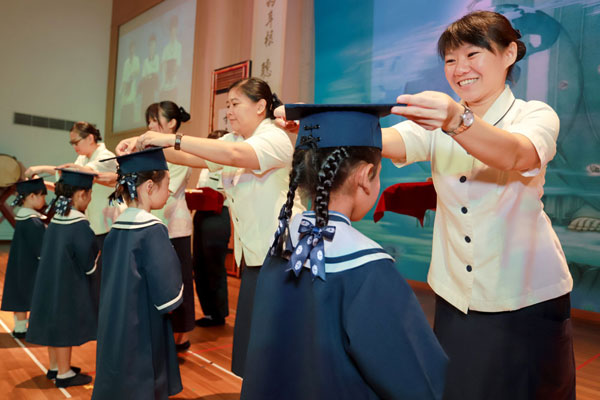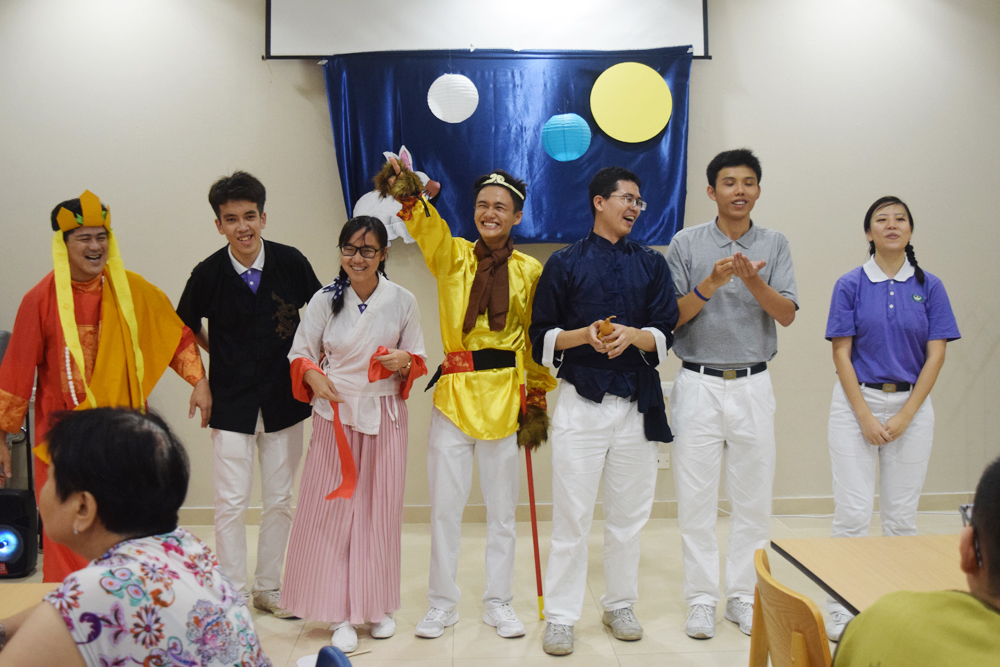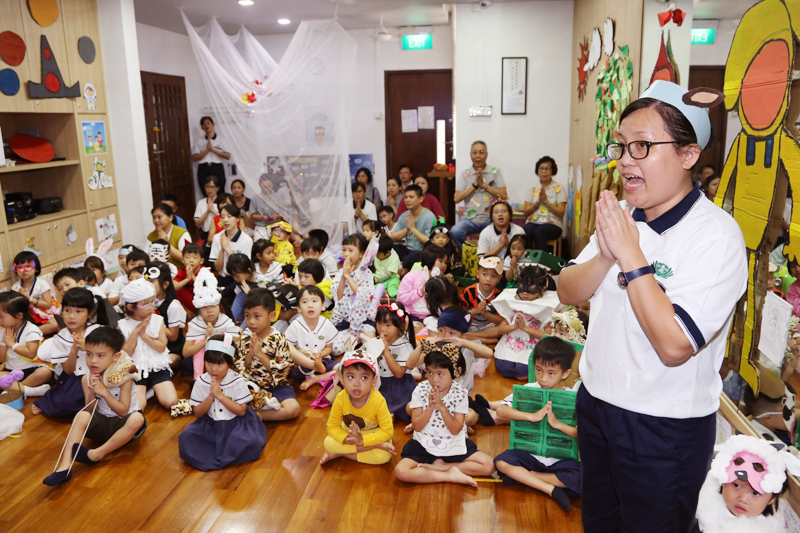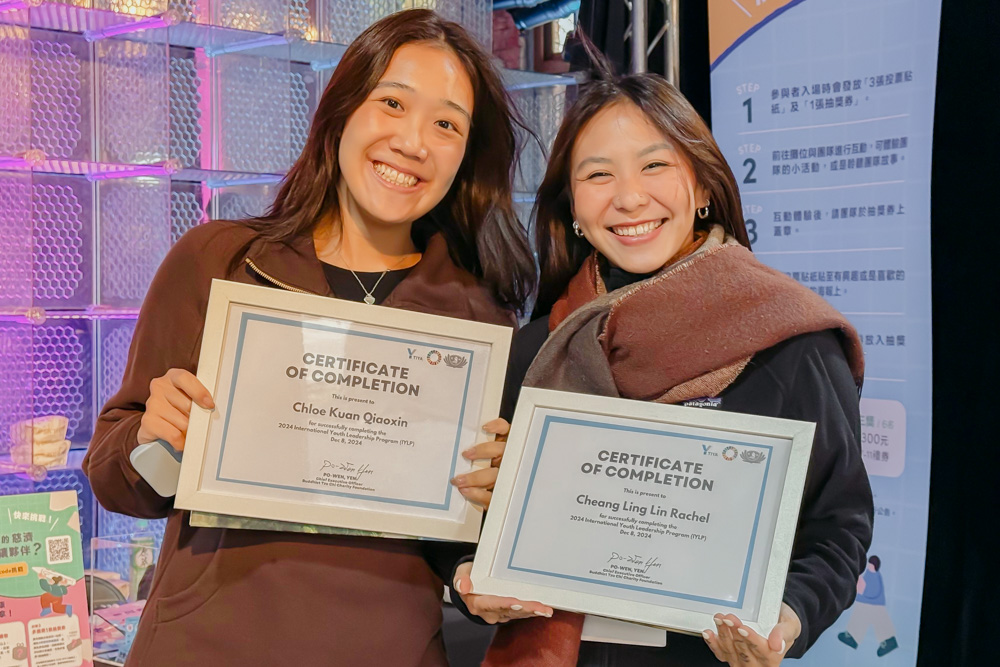 Chloe Kuan (left) and Rachel Cheong's (right) School of Imagination project won third place in the International Youth Leadership Program.
Chloe Kuan (left) and Rachel Cheong's (right) School of Imagination project won third place in the International Youth Leadership Program.
In the past two years, during her occasional visits to the Tzu Chi Humanistic Youth Centre (HYC), Rachel Cheong often spent her leisure time enjoying the open spaces and lush trees surrounding the park. She always thought to herself how great it would be if more children could get out into nature like this.
In the middle of this year, Rachel and her partner, Chloe Kuan, came up with an idea and proposed it to the HYC team. They suggested organising a one-day "adventure" activity for primary school students, providing an opportunity for children to step out of their classrooms and immerse themselves in nature. The activity would include storytelling and artistic creation to inspire their imagination and creativity.
The two named this community project School of Imagination. After months of planning and practice, they successfully put the plan into practice and won third place in the International Youth Leadership Program (IYLP).
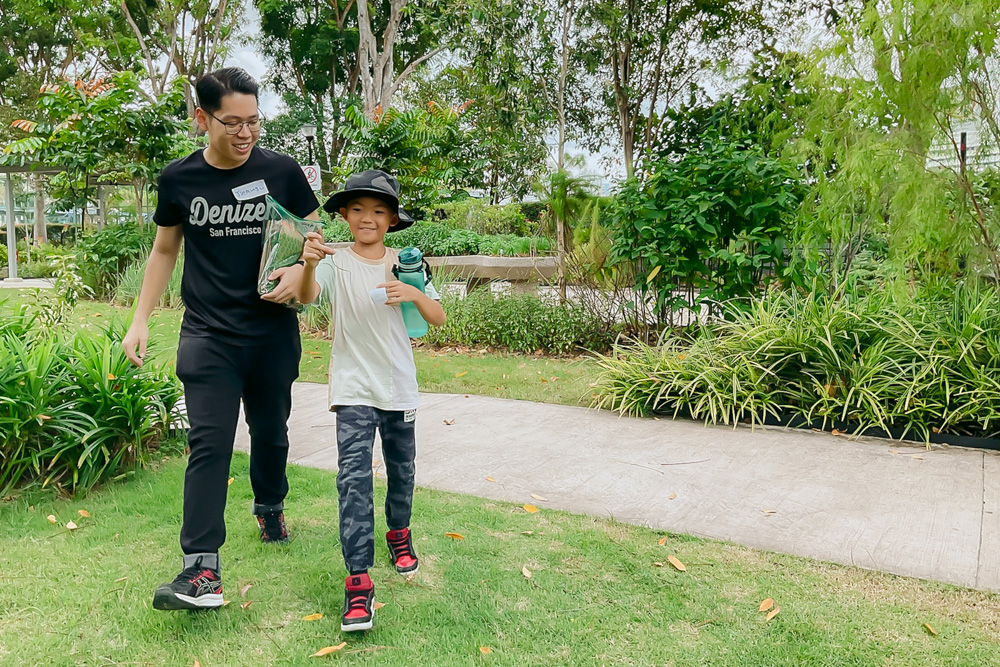 The School of Imagination accompanies children to explore nature, while integrating storytelling and artistic creation activities to inspire their imagination and creativity. (Photo by Chua Teong Seng)
The School of Imagination accompanies children to explore nature, while integrating storytelling and artistic creation activities to inspire their imagination and creativity. (Photo by Chua Teong Seng)
Responding to the challenges of the times with individual conviction
In recent years, the global society and environment have been facing rapid upheavals, with challenges such as climate change, human rights issues, and poverty emerging one after another. At the same time, more and more young people are willing to step forward to confront these issues using social innovation. This year, the IYLP welcomed its third season, and also the first time with participation from Singaporean youths.
The IYLP is organised by the Tzu Chi International Youth Association (TIYA) for young people aged 20 to 35, providing them with comprehensive training courses and practical opportunities. This year's programme started in March, featuring a range of courses led by professional speakers at the international level. The objective of these course was to train young people to explore sustainable development issues. In Singapore, HYC provided local support to connect young people with connections and resources to help them realise their public welfare aspirations.
A total of five young people from Singapore participated in this programme, divided into three groups. In addition to Rachel and Chloe's School of Imagination, the other two groups focused on sleep health and environmental protection. One group worked to help office workers explore the importance of sleep through interactive booths and workshops, while the other one focused on encouraging catering companies to adopt reusable tableware, reduce the use of disposable cutlery, and minimise carbon footprints at the source.
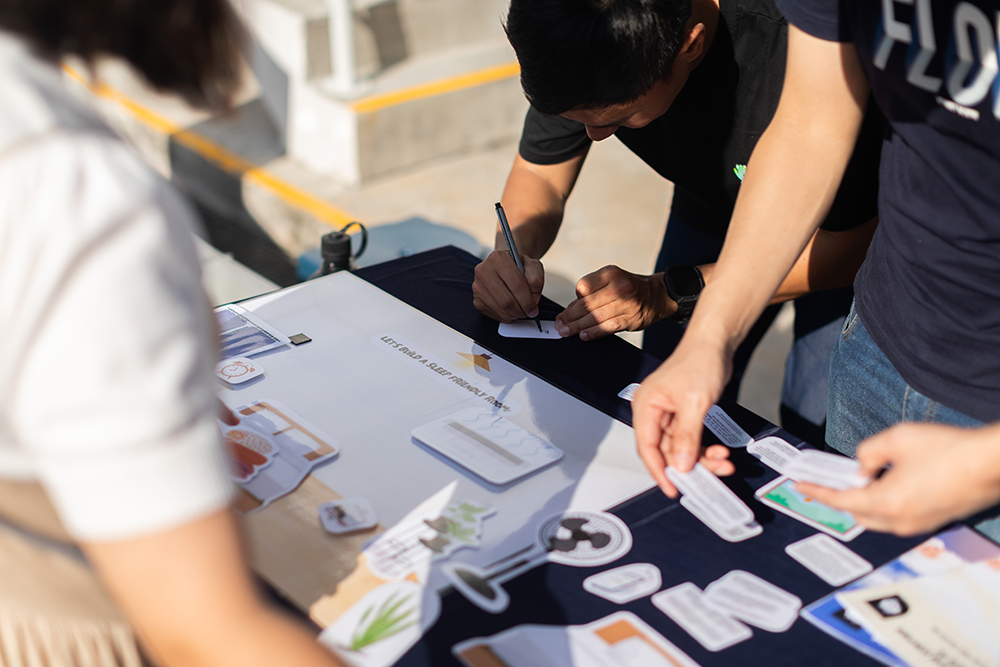
The interactive games at the sleep hygiene promotional booth have attracted many young people to stop by and take part. (Photo by Donn Tan)
Sustainable justice beyond beach clean-up
How can we get city kids back in touch with nature and unleash their imagination through art and stories? During the school holidays in September last year, Rachel and Chloe jointly created the School of Imagination, which moved the classroom to nature, allowing the children to discover the charm of nature using flowers, plants and leaves as their medium.
“Many educational activities focus on specific topics such as beach cleaning and recycling, but there are few opportunities for children to really get close to nature.” The two wanted to make sustainable issues down-to-earth and connect children to the actual situation in Singapore. Chloe said, “In Singapore, the risks of contact with nature are often being exaggerated, such as fearing that children will fall or get hurt. This made us feel that we need to use a more relaxed method to let children get closer to nature.”
The two looked up relevant research and found that too few opportunities to be exposed to nature are not conducive to children's psychological development. Rachel explained, "Children in urban areas tend to spend more time indoors or using electronic devices, and when it comes to education, academic performance is often more focused than overall development."
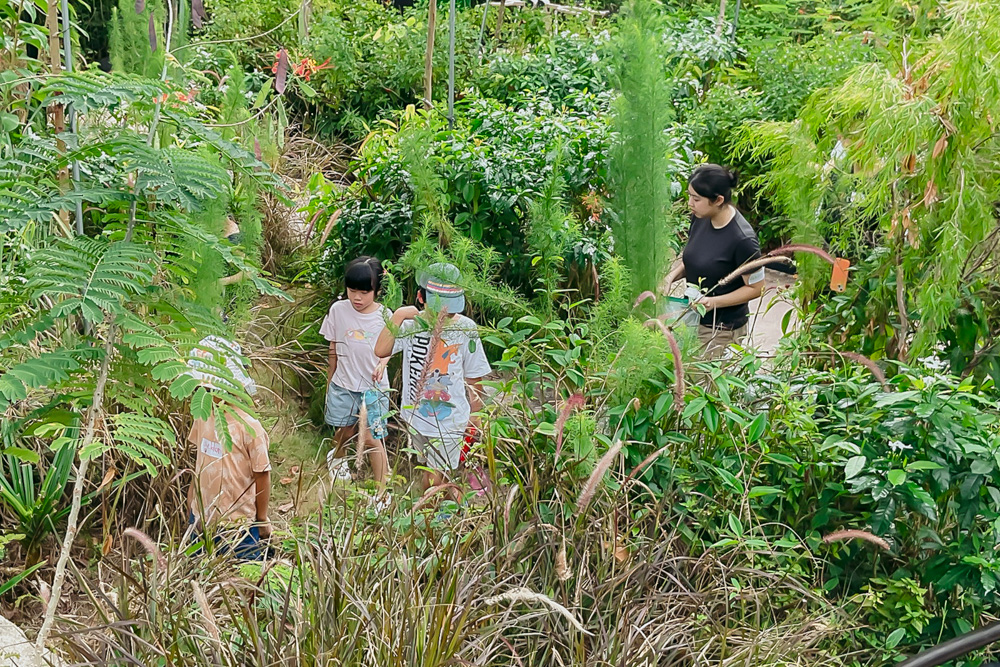
Accompanied by volunteers, the children walk into the park surrounding HYC. (Photo by Chua Teong Seng)
To make the programme more down-to-earth, Rachel and Chloe chose the park around HYC as the venue. The programme received full support from the HYC team and mentor Sharifah Faizah. As the Youth Outreach Officer of HYC, Sharifah provided many valuable suggestions, such as how to coordinate the use of the venue to avoid interference from other activities. It took five months to prepare for this one-day camp, including two trainings for the volunteers to familiarise themselves with the methods and concepts of the "Forest School".
Despite thorough preparations, the team faced moments of confusion while managing 20 children with diverse personalities on the day of the event, but there were also many pleasant surprises. Rachel recalled, "We did not set a clear path, so as to allow the children to explore on their own. They used the fallen leaves and flowers they picked along the way to complete their artistic creations and also participated in nature sketching."
In another session, volunteers encouraged the children to communicate with nature through stories and drawings. "We guided the children to imagine, 'If there were a person living in this garden, what story would he have?' Some children touched basil leaves and mint leaves and then improvised small stories." Chloe said, "But some children complained about the heat and even forgot to bring water bottles. The whole scene was a bit chaotic."
Despite these challenges, the two believe that these moments are part of the growing up process. As Chloe said, "As long as the children can gain their own experience from it, it's all worth it."
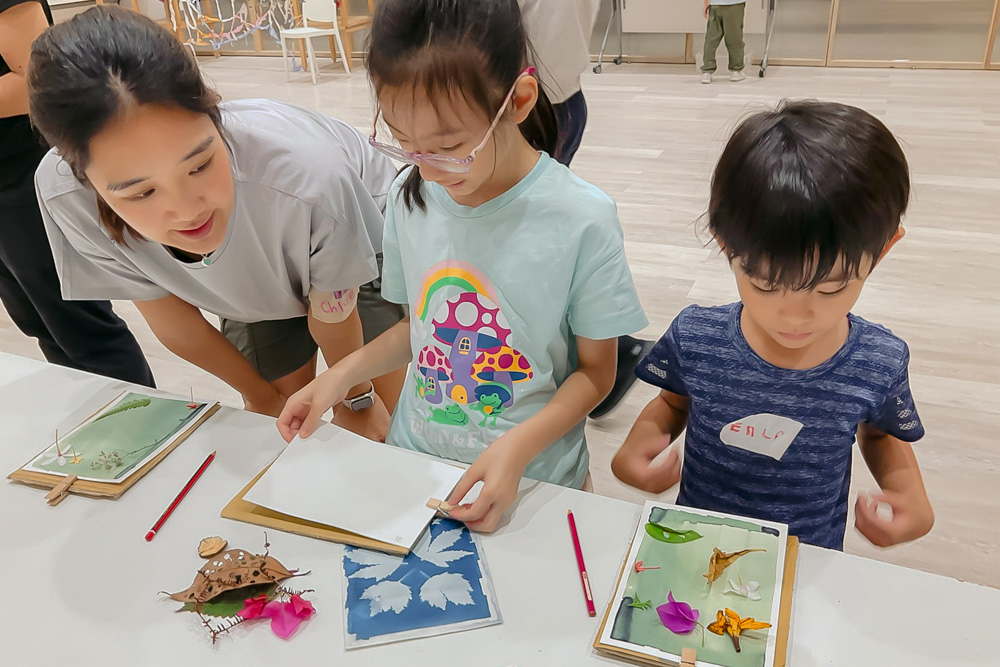 Chloe (first from left) encourages children to communicate with nature through stories and drawings. (Photo by Chua Teong Seng)
Chloe (first from left) encourages children to communicate with nature through stories and drawings. (Photo by Chua Teong Seng)
Youth Co-Creation for the Greater Good
These youths have deliberately chosen meaningful paths in life. Rachel volunteered with the Ground-Up Initiative (GUI), contributing to building a "kampong community," and gained hands-on experience serving at a community club. Chloe, who connected with Rachel during university due to her interest in environmental issues, now works at a non-profit organisation helping start-ups develop water resource solutions.
Another participant, Chime Ngawang, is a social worker focused on suicide prevention and mental health support. Beyond his demanding career, he initiated The Counting Sheep Project, a community effort addressing sleep hygiene concerns.
"In Singapore, a culture of glorifying late nights and busyness starts as early as school years, causing many to overlook the importance of rest," Chime explained. According to a global sleep survey, Singaporeans average just 6.5 hours of sleep per night, ranking third lowest worldwide.
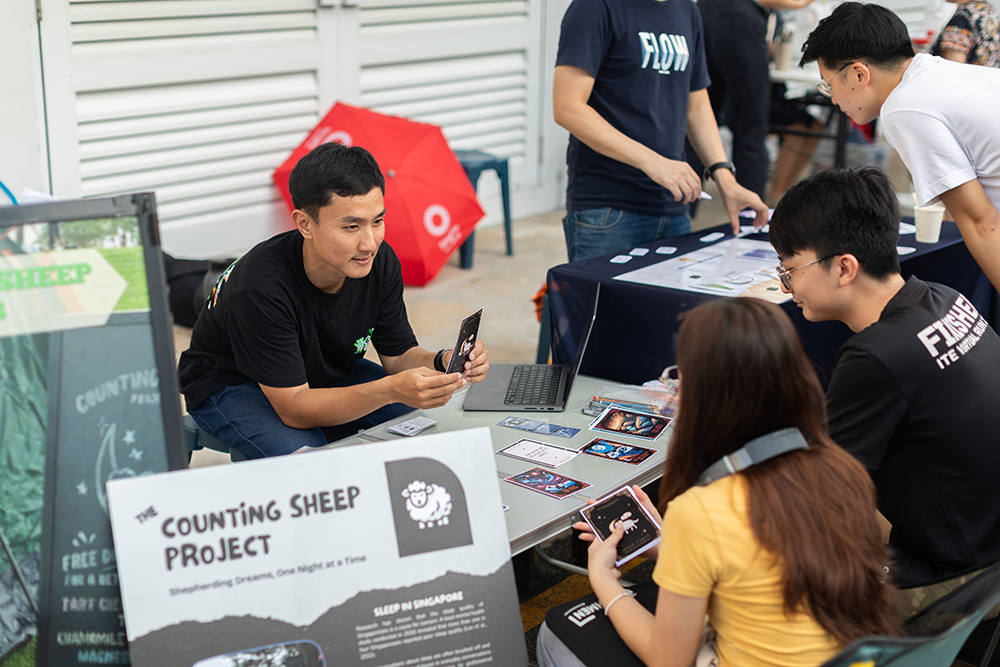 Chime Ngawang (left) extends his passion for sleep awareness to community initiatives through The Counting Sheep Project. (Photo by Donn Tan)
Chime Ngawang (left) extends his passion for sleep awareness to community initiatives through The Counting Sheep Project. (Photo by Donn Tan)
The Counting Sheep Project approaches the topic of sleep with youth-friendly methods, using engaging games to simplify sleep science. For instance, in the "Design Your Room" game, players learn how to adjust lighting, noise, and layout to create an ideal sleep environment. Meanwhile, the "Sleep Tarot" card game encourages players to reflect on their daily habits and their impact on sleep through a fun and interactive guessing game.
"Instead of relying solely on experts, we aim to provide people with a relaxed starting point through games or peer-sharing sessions," Chime explained.
With support from the HYC, Chime hosted an awareness booth at a “Parking Day" event and organised an in-depth sleep workshop in October. The 2.5-hour session featured two professional psychologists and covered topics like sleep science, optimising sleep environments, and relaxation techniques.
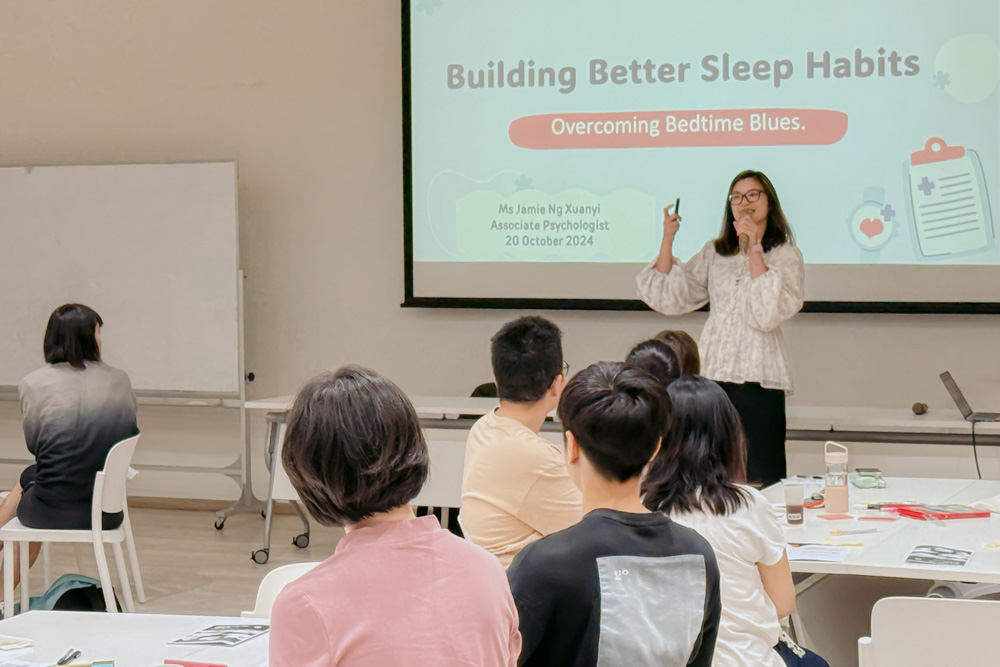 Two professional psychologists participated in the sleep workshop to provide expert insights. (Photo by Pang Jin Yan)
Two professional psychologists participated in the sleep workshop to provide expert insights. (Photo by Pang Jin Yan)
“Many participants have faced sleep issues at some point in their lives, with some struggling for decades,” Chime shared. “It was heartening to see them learn from the experts and find support through peer sharing, creating a sense of belonging in the community.”
Chime expressed his gratitude toward the HYC for providing the venue, volunteer support, and outreach efforts. “HYC allowed me to connect directly with the community. I also benefited greatly from the planning and execution process, learning professional planning methods from the mentors.”
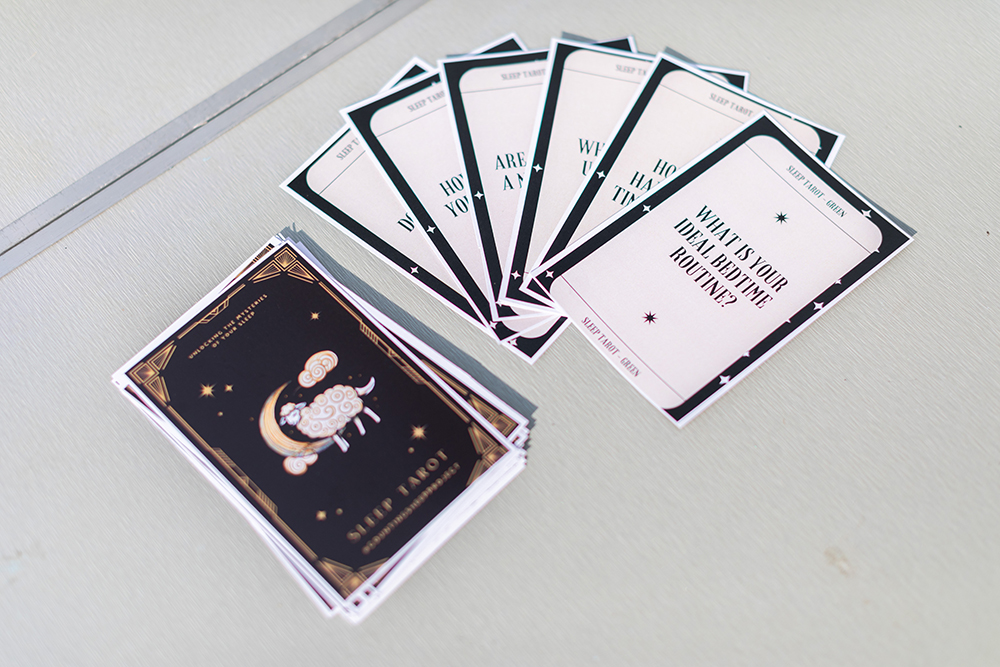 The "Sleep Tarot" card game encourages players to reflect on their habits and their impact on sleep. (Photo by Donn Tan)
The "Sleep Tarot" card game encourages players to reflect on their habits and their impact on sleep. (Photo by Donn Tan)
Advocating sustainability at the Youth Centre
HYC regularly collaborates with various organisations to host events. Still, some seemingly successful events often result in wasted resources, particularly when disposable cups and utensils are used and difficult to recycle.
Recognising the importance of sustainability in today’s corporate image, Ng Wei Lun and Sherin Tan initiated The Green Space Project to promote reusable tableware and reduce pollution through the Tzu Chi concept of "Purity at Source." They also developed the Impact Quantification Model, a carbon footprint tracking system to measure waste reduction and carbon emissions, which helps persuade event organisers to adopt eco-friendly approach.
Wei Lun and Sherin are preparing for the project’s first pilot event next year. They have finalised a preliminary agreement with reusable tableware suppliers and plan to coordinate logistics between food vendors and event organisers to establish a sustainable dining service process. Nonetheless, they also encounter challenges including coordinating logistics, ensuring food hygiene, and maintaining cost-effectiveness.
“Ensuring the solution is economically sustainable while maintaining high standards of food hygiene is our top priority,” Wei Lun said.
The Green Space Project aims to plant the seeds of environmental consciousness in the community, helping participants understand that individual choices can bring positive changes to the planet. As Master Cheng Yen once said, “Reducing resource waste is a blessing for humanity; recycling resources can enrich society.”
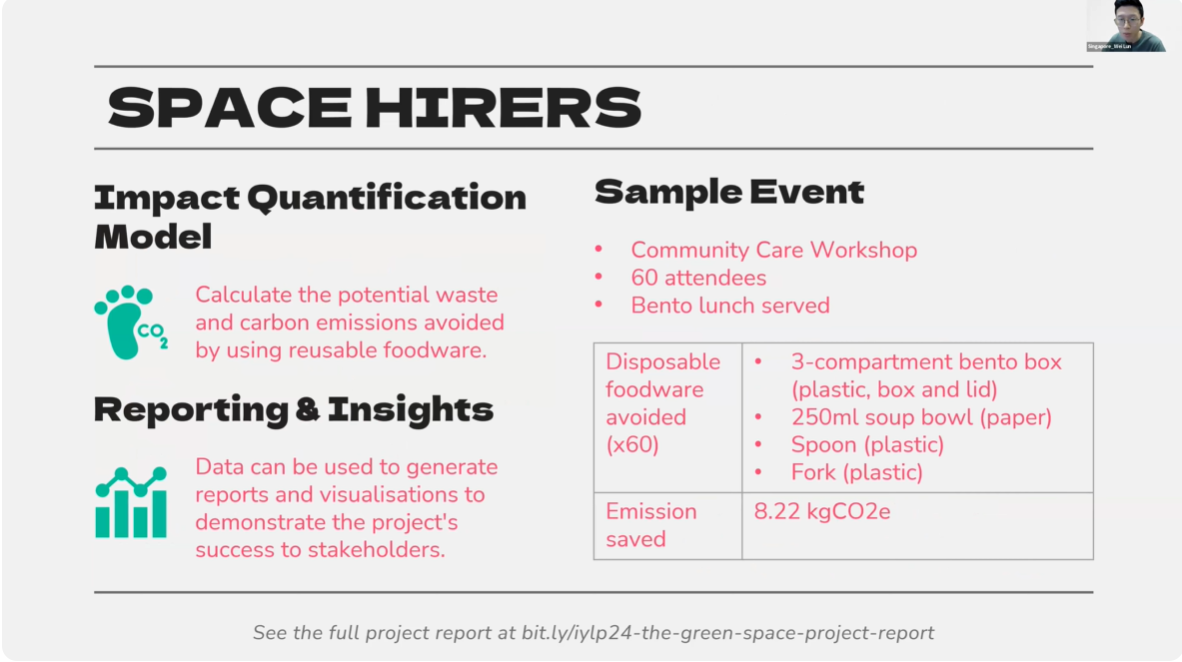 Ng Wei Lun and Sherin Tan present The Green Space Project at the International Youth Leadership Development Program.
Ng Wei Lun and Sherin Tan present The Green Space Project at the International Youth Leadership Development Program.
Their mentor, Mavis Yeow, who also serves as HYC’s Sustainability Officer, shared her perspective on the initiative. “While HYC has been advocating sustainability, our actions sometimes fall short in practice,” Mavis admitted. She cited an example: though posters explaining the "5R Environmental Principles" are displayed, the visible embodiment of these principles in daily operations is often lacking. The Green Space Project bridges this gap by integrating sustainability into the centre's activities and demonstrating concrete environmental efforts to the public.
Mavis also observed that the participating youths demonstrated remarkable enthusiasm and determination despite their demanding lives. “They have families and careers, yet they still dedicate their spare time to sustainability efforts. Their commitment and perseverance deeply inspire me,” she said.
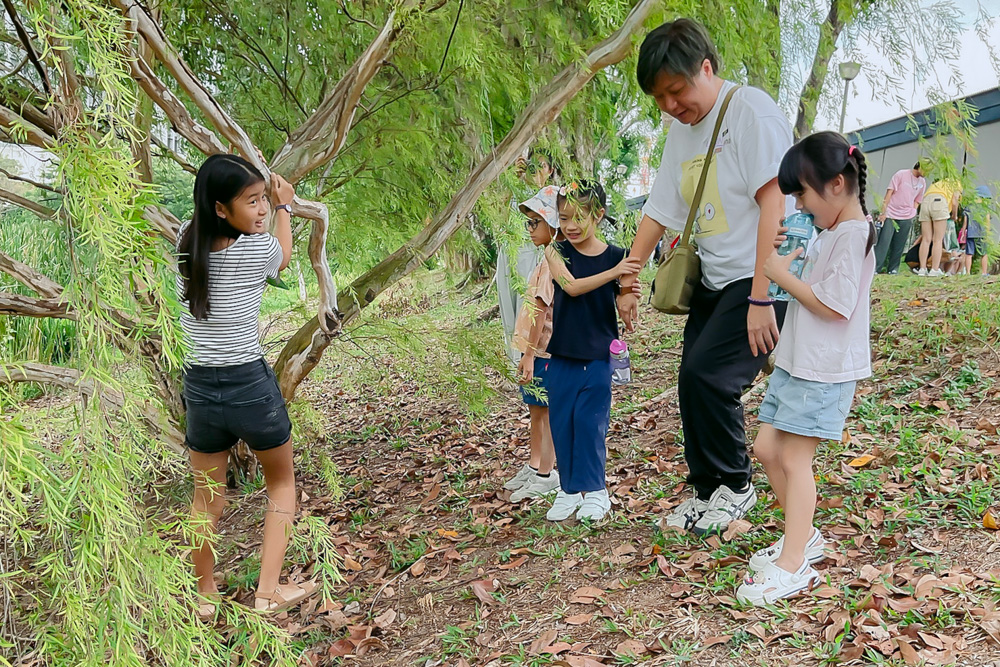 (Photo by Chua Teong Seng)
(Photo by Chua Teong Seng)
Reflecting on her recent discoveries, Rachel shared how urban challenges are closely tied to sustainability and justice. “The ultimate goal is to connect people, oneself, and the environment,” she explained. “The methods we use to achieve this connection depend on each individual’s choices.”
Chime echoed this sentiment, adding, “Sleep is not just about rest, it’s about improving the quality of life and enabling people to find greater balance and happiness.”

